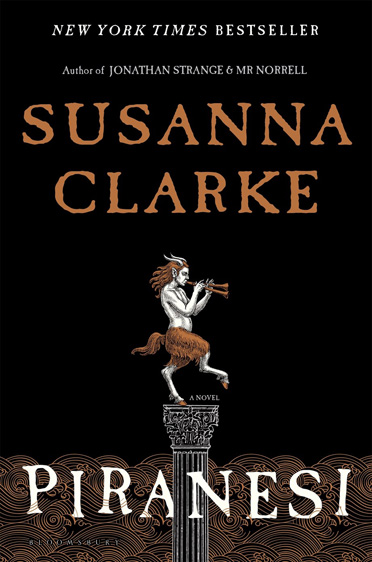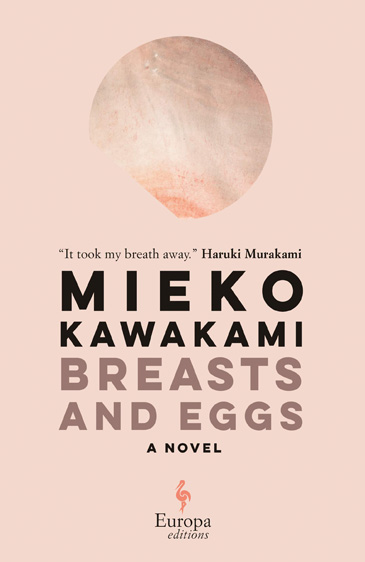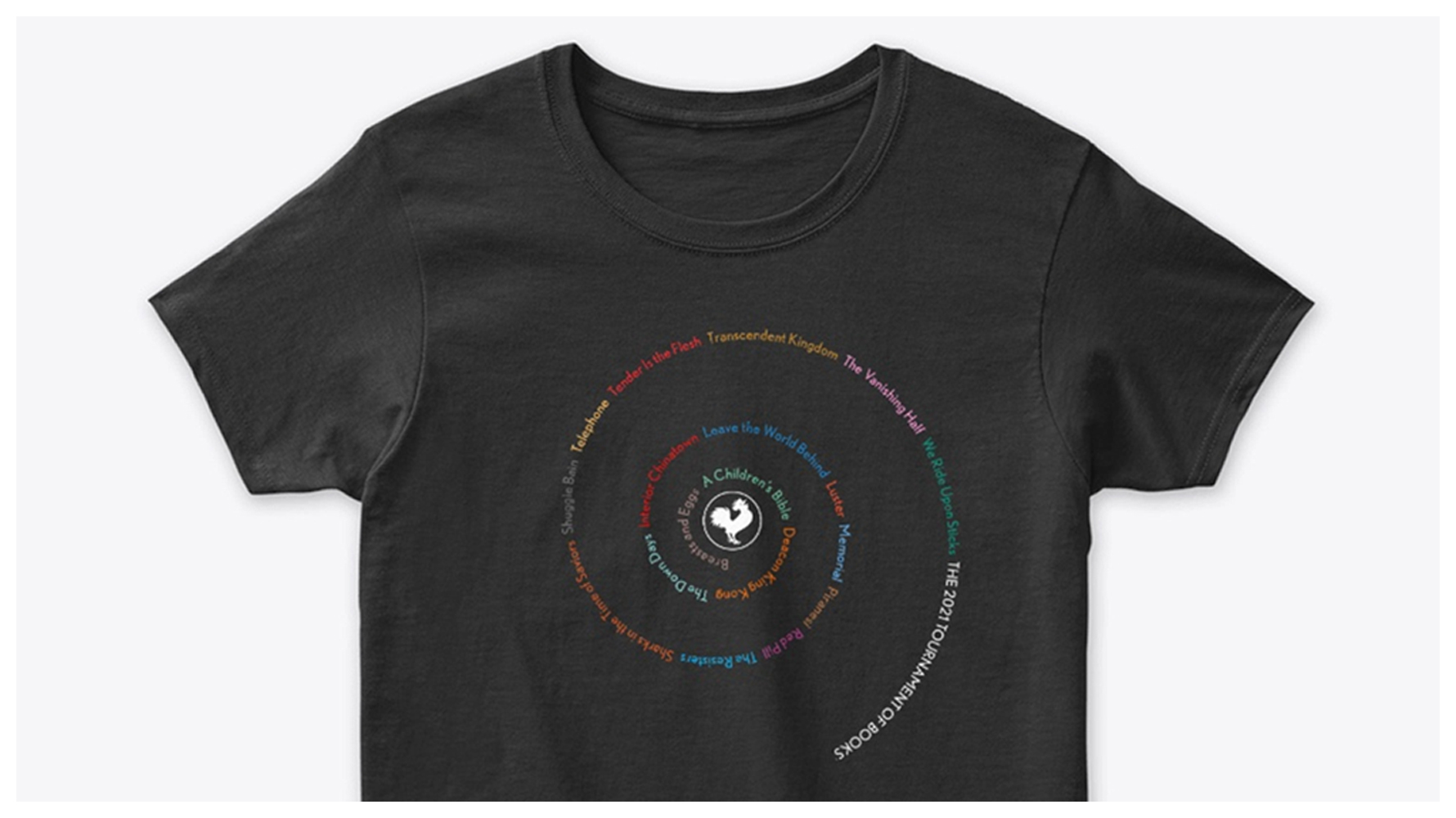-
March 16, 2021
Opening Round
-
Susanna Clarke
2Piranesi
v.
3Breasts and EggsMieko Kawakami
-
Judged by
Beatrice Kilat
Piranesi and Breasts and Eggs are two books concerned with magic. Which is what I want to talk to you about—the books, of course, this is the Tournament of Books, but magic, real magic: the persistent unexplainable.
In Piranesi, we follow a man alone, one of two people living in an organized, chaotic, labyrinthine world. The world is a House, and the House is the whole world. The novel is written as a series of near-daily journal entries, introducing us to this world’s vestibules, halls, staircases, and the rising and receding tides of the water beneath everything. Within the House, there are different halls filled with broken objects and thousands of statues. There are 16 people total in this world, but only two of them are alive on the page.
You can read all sorts of loneliness into this existence, but Piranesi is clearly fulfilled by the task of living and observing in the world. It’s reassuring to read being alone as a complete activity. With enough time on your own you can become wild, something new. And you really do in this world. That’s magic.
Twice a week, Piranesi meets with the Other, the only other living person in the world, and they work on finding a “Great and Secret Knowledge.” The Other believes this is hidden within the House. He thinks it will grant them some sort of magical power, maybe immortality, maybe flight. Maybe anything. The Other does not explore the House and is quite obviously scared of what he doesn’t know or understand in the world. In contrast, Piranesi has a great interest and respect for the known and unknown elements of the House. He knows the House’s ins and outs (“The Beauty of the House is immeasurable…”), knows the skeletons he counts among the people in the world, the timing of the tides, the statues and the halls where they can be found. He bears witness to the House and its gifts as though it’s a sacred task and so it is (“…its Kindness infinite.”) This, too, is magic.
The predictable arrangement of the House is thrown into disarray when it’s revealed that there are more than 16 people who exist in the world. And not only are there more living people, but the Other says they are dangerous and mean to cause them both harm.
This is the way the world goes, isn’t it? The more people who enter into it, the more unpredictable and dangerous it becomes. Life is complicated by others, it’s true.
Breasts and Eggs tells the story of three women in Japan over two books. The first book covers a couple nights in Tokyo with sisters Natsuko (called Natsu), Makiko, and Makiko’s preteen daughter Midoriko. Natsu is a single, 30-year-old writer who moved to Tokyo when she was 20 and, 10 years on, still lives in the same apartment, works the same minimum wage job, and is still “writing and writing, with no idea of whether it’s ever going to get [her] anywhere.”
Makiko lives and works as a hostess in the Osaka neighborhood where the women grew up, a town “ripe with salt and haunted by the action of the tides.” She earns a fluctuating and low wage, just like her mother and grandmother who worked the same job before her, and raises her daughter without the help of her daughter’s father, like her mother did, too. “Another single mother, working herself to death,” thinks Natsu. Makiko has traveled to Tokyo to get a consultation for a breast augmentation surgery. She’s obsessed by it, knows all about the many different options and possibilities.
There’s a full range of Note Books and related stationery products at fieldnotesbrand.com. Field Notes is proud to once again be a sponsor of the Tournament of Books.
Natsu and Makiko’s lives have been built on precarity and tragedy since their youth. Their mother died of breast cancer when Natsu was only 13, and their grandmother, who helped raise them after their father vanished, died from lung cancer two years after that. They both began working at bars, then Makiko became pregnant, and Natsu helped her for a few years before moving to Tokyo, where her life was more hopeful than it was in Osaka, but was still stagnant as the specter of poverty hovered over her, her landlord knocking at her door to collect overdue rent. No sudden movements, only keeping what she could hold onto, like the old books given to her by a patron at the bar she worked at in Osaka before moving to the city. That’s magic, getting out.
There’s something deeply refreshing about money being the fulcrum on which so much of the book hinges. Because that’s how it works in real life, too. Poverty affects how much you work, how you exist in relation to other people, and it can reduce you to what you can carry, like a woman packing only what she can carry in the night, or figuring out the return on investment of silicone breasts and supermarket eggs.
In the first book, Midoriko is in that sweet stage of adolescence wherein your human body and any body that recalls it can fill you with disgust and then anger. She’s old enough to see and feel how stressed her mother is about money, and in her adolescent understanding, she knows her existence contributes to the complication of her mother’s life. In her journal, Midoriko writes:
Once you get your period, that means your body can fertilize sperm. And that means you can get pregnant. And then we get more people, thinking and eating and filling up the world. It’s overwhelming. I get a little depressed just thinking about it. I’ll never do it. I’ll never have children. Ever.
Precarity touches every part of the women’s lives, and by extension, Midoriko’s life, too. The stress of their living situation paired with puberty manifests itself in the young girl’s refusal to speak, only communicating at home via written words until she and her mother are able to reach a catharsis with the help of a few handfuls of cracked eggs.
We move forward eight years in the second book, and Natsu has moved into a new apartment by force and not by choice: Her old apartment was demolished. She has published a short-story collection, has an agent and enough money for herself and to send home to Makiko and Midoriko, who is now in college with a sweet boyfriend. Enough space has opened in Natsu’s life that she can have desires outside of simple survival, but, in the same way that we followed Midoriko at the start of puberty, we are now with Natsu as she approaches the end of her fertility. This is the time of her life in which she must make a decision and it’s complicated, because life is complicated, with or without other people. And so is bureaucracy and work, and money, which, when you’ve been poor, is never a guarantee, even when you have it. It’s complicated to try to form answers to questions for a person who does not and maybe will not exist, but could exist someday if you decide, but then who are you to decide? There is magic in not knowing but continuing on anyway, in not retreating into private worlds separated from others, but to leave the door open for others to come in. Other people make the world more complicated, because they make our worlds bigger, better. They make us ask questions and find answers. They help us trust the sacred insanity of our gut instinct, of ourselves. That’s magic.
And both Piranesi and Breasts and Eggs deal with the limits of what we have and what we know, whether the world is house or a family. The wide world is here in these two novels, you could read them in a loop and never stop, this could be enough. The singular self and work, death, life, and family: Here is the world. We are surrounded by the stories of the dead and their mysteries and we are all walking down complicated halls of experience, at risk and at our best in the midst of hope and pleasure and dreaming. The fact of the end is irrevocable, unremarkable, but the things in between can be exceptional. That’s why we let other people complicate our lives. Because none of us asked to be here and yet here we are. That’s magic.
I loved the experience of Piranesi’s halls and mind, but Breasts and Eggs has real guts. As do I. As do you. You should read both, but it’s Breasts and Eggs that’s advancing to the next round.
Match Commentary
By Kelso McNaught & Rosecrans Baldwin
Rosecrans Baldwin: Hello, Rooster readers! Today we’re joined in the booth by Kelso McNaught, a bookseller at the old and beautiful Gibson’s Bookstore in Concord, NH. Kelso, can you tell us a little about Gibson’s?
Kelso McNaught: Hello, folks! Gibson’s is the largest indie bookstore in northern New England (12,000 square feet!). We strive to provide the best in intelligent entertainment ever since we opened our doors in 1898. We’re big, we’re old, we’re here to stay.
Rosecrans: Amazing. And how would you describe yourself as a reader?
Kelso: For work I often read adult queer lit and queer authors, but in my downtime I read essay collections, short stories, and I’m a sucker for science fiction. Give me something with a giant robot in it, and I’ll be happy!
Rosecrans: Let’s talk about the judgment. I really enjoyed how the judge starts off with magic, especially because the literary world takes itself so seriously, and still, even in its most somber chambers, the ones wallpapered with unsmiling author photos—
Kelso: Ah yes, the stuffy hallways of “high literature” that we should all take very seriously, even though deep down all authors are just big nerds.
Rosecrans: Well, yes—
Kelso: There’s no shame in that! Let loose, authors!
Rosecrans: Speak! Because even in those hallways, magic plays a part. So, does the appeal of “the persistent unexplainable” ring true for you?
Kelso: I’ve read Piranesi, but not Breasts and Eggs (yet!), but I can subscribe to this kind of unexplained magic, or “persistent unexplainable,” especially in the everyday. How often does a person find micro-acts of unexplained happenings in their ordinary days? Extra time in a parking meter when you park the car? A meter officer not giving you a parking ticket when your meter accidentally expires while you’re at work? (You can sense a theme about my day, right?)
Rosecrans: I guess Concord needs more parking? The deciding factor, it seems, was the judge responding to a type of courage found in Breasts and Eggs, the will to deal in the rough and tumble of commonplace experience—debts, bodies, relatives; people complicating their own and each other’s lives in ways that feel singular but universal. “Because none of us asked to be here and yet here we are.” It made me think how plenty of writers approach their stories in a similar manner: frames that look small but encompass tons of life.
Kelso: Oh, absolutely! I feel like I can connect with the character, and by extension the writer, when they detail a small, seemingly mundane routine like flipping laundry or waiting for the bus. The embarrassment and humiliation of the main character trying desperately to find floss in their bag to dislodge a piece of kale during a first date.
Rosecrans: The embarrassment of saying things like SHOOT IT IN MY VEINS long after it’s interesting to say such a thing. (Patricia Lockwood is us.)
Kelso: Commonplace experiences connect us and I think that’s why Breasts and Eggs outweighs Piranesi in this matchup. Kawakami is showing us the sacredness and magic of our everyday lives, and I feel like a lot of readers can see themselves in that landscape.
Rosecrans: That’s right. It reminds me that I like this line from the judgment: “The wide world is here in these two novels, you could read them in a loop and never stop, this could be enough.” That sense of “the wide world” is often what I crave from fiction, even in stories with the smallest structures. When you’re reading outside of work—or for work too, I guess—what matters most to you?
Kelso: Wow, what a difficult question! There’s just so many working parts and different ways a book can click for me, ranging from accurate representation and equity of marginalized folks to how many fart jokes are in it. Honestly, what it boils down to—for me at least—is finding a genuine connection to the text.
Rosecrans: What kind of connection?
Kelso: I believe literature’s purpose is to connect ideas and get us thinking and talking about the topics presented in a book, whether it’s William Shakespare, Karl Ove Knausgård, or Sam Irby. The quickest way to find that connection is how I can relate to this book. What is this character feeling, thinking, eating that makes me jump up and go, “Yeah, I too have IBS and miss eating cheese,” or “I have felt a similar injustice in my life too, what can we do to change that?”
Rosecrans: Terrific. To close for today, a question we’re asking all of our booksellers (readers, support your booksellers!)—how has bookselling been different lately for Gibson’s and for you?
Kelso: My role has definitely changed. We had to beef up an online ordering system practically overnight. I had to build a shipping department on Scotch tape and whispers. But this ship of fools is still here, and everything seems to be holding together. Thanks to the hardworking staff and of course our customers, whom I cannot seem to thank enough. I do miss seeing them physically, and I don’t see my role changing back to what it was in the pre-pandemic times. The staff and I are hopeful that we are going to see this bookstore past the pandemic. As for me, I just want to hug my mom again.
Rosecrans: Cheers to that. Major thanks to Kelso for joining us today, and thanks to everybody for reading. See you in the comments!
New 2021 Tournament of Books merch is now available at the TMN Store. As a reminder, Sustaining Members receive 50 percent off everything in our store. To find out why we’re asking for your support and how you can become a Sustaining Member, please visit our Membership page. Thank you.
Welcome to the Commentariat
Population: You
To keep our comments section as inclusive as possible for the book-loving public, please follow the guidelines below. We reserve the right to delete inappropriate or abusive comments, such as ad hominem attacks. We ban users who repeatedly post inappropriate comments.
- Criticize ideas, not people. Divisiveness can be a result of debates over things we truly care about; err on the side of being generous. Let’s talk and debate and gnash our book-chewing teeth with love and respect for the Rooster community, judges, authors, commentators, and commenters alike.
- If you’re uninterested in a line of discussion from an individual user, you can privately block them within Disqus to hide their comments (though they’ll still see your posts).
- While it’s not required, you can use the Disqus <spoiler> tag to hide book details that may spoil the reading experience for others, e.g., “<spoiler>Dumbledore dies.<spoiler>”
- We all feel passionately about fiction, but “you’re an idiot if you loved/hated this book that I hated/loved” isn't an argument—it’s just rude. Take a breath.




